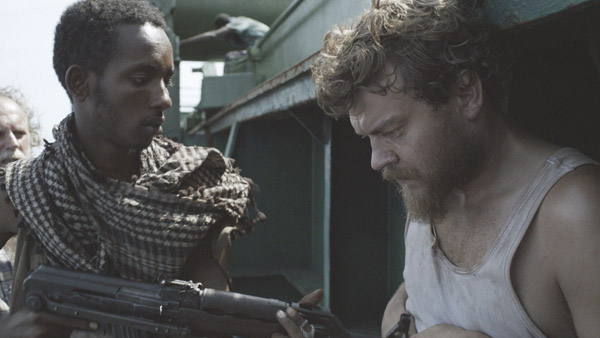![]() Tobias Lindholm’s tense, compelling drama A Hijacking is often as stark and brutally matter-of-fact as its rather plain title. However, it remarkably generates much suspense and anxiety without resorting to the clichéd action thriller tropes of many other movies with similar subject matter. There are no Hollywood-type heroes who single-handedly save the day, no hysterical scenes with frantic loved ones of the hijacking victims, no loud dramatic music to tell us how we should feel.
Tobias Lindholm’s tense, compelling drama A Hijacking is often as stark and brutally matter-of-fact as its rather plain title. However, it remarkably generates much suspense and anxiety without resorting to the clichéd action thriller tropes of many other movies with similar subject matter. There are no Hollywood-type heroes who single-handedly save the day, no hysterical scenes with frantic loved ones of the hijacking victims, no loud dramatic music to tell us how we should feel.
Instead, Lindholm replaces all these tired genre mechanics with a deep commitment to the realistic portrayal of the workings of modern day piracy. A subdued, simmering tension and a palpable sense of the perilous nature of the situation for all involved permeates every frame, only becoming more potent because of his scenario’s lack of overt melodrama. Combined with very fine performances, this makes for an indelibly memorable experience.
A Hijacking centers on the fate of the Rozen, a Danish cargo ship sailing in the Indian Ocean on its way home. Life on the ship is seen mostly through the eyes of Mikkel (Pilou Asbaek), a gregarious, bear-like man who we first see talking to his wife and young daughter on the phone, telling them that he will be home soon. Unfortunately for Mikkel and the rest of the crew, this is not to be. After this initial scene, the action shifts to the shipping company that owns the vessel, where Peter C. Ludvigsen (Soren Malling), the company’s CEO, is in the midst of intense negotiations with a group of Japanese businessmen. This initial introduction to Peter’s style of hard-nosed bargaining neatly foreshadows the much more serious negotiations, with far higher stakes, that will consume him for the rest of the film.
Soon after, we learn along with Peter and his staff that the Rozen has been hijacked by a band of Somali pirates. The pirates’ initial act of boarding the ship and taking the crew hostage happens entirely off screen. Lindholm admirably eschews the more sensational drama that could be wrought, preferring to concentrate on the much more compelling drama of the negotiating process between the shipping company and the pirates.
The company hires Connor Julian, a piracy negotiations expert, to work with Peter to resolve this crisis. Connor advises Peter to appoint a neutral third party to represent the company during communications with the pirates. Peter, however, insists on handling the negotiations himself, taking full responsibility for the task of getting his crew and his ship safely home. Connor warns him that there’s a danger of Peter becoming too emotionally involved and making fatal errors, and he reiterates his strongly worded advice against this. Peter nevertheless forges ahead with talking directly to the pirates, with Connor close by his side to offer his expert advice.
Meanwhile, on the Rozen, the rifle-toting pirates confine the crew to two separate rooms, not allowing them to even use the bathroom; they are forced to urinate and defecate inside the cabins. Mikkel must make meals for the pirates, often with one of them pointing a rifle at his head.
The film shuttles back and forth between life on the ship and the negotiations happening in Copenhagen, setting up a sharp contrast between the rough environment on the ship and the shipping company’s sleek, gleaming ultra-modern corporate offices. Speaking on behalf of the pirates is Omar (Abdihakin Asgar), who is a disembodied voice on the phone to the company, but on the ship he’s a complicated figure, the only person on the opposing side who emerges as a real character, as opposed to the non-English speaking pirates who remain a mysterious, implacable mass. Omar insists that he’s not a pirate, and has only been enlisted as a go-between; he gets very angry and deeply offended at any suggestion otherwise.
The negotiations between the shipping company and the pirates are an intense battle of wills. The pirates’ initial ransom demand is $15 million; Peter, following Connor’s advice, counters with an offer of $250,000. This begins a psychological battle between the two sides that stretch into days, weeks, and months of negotiations. On the ship, food and supplies start to become dangerously low, and the pirates increase their threats to harm crew members. At the company, Peter’s superiors become increasingly impatient with him, and threaten to replace him if he doesn’t succeed in resolving this crisis within a reasonable time frame.
Much like Lindholm’s previous film, the prison drama R (co-directed with Michael Noer), A Hijacking brilliantly portrays intense psychological and physical action within cramped spaces. Lindholm greatly enhances his scenario with a documentary style and a sense of realism; he filmed on an actual working ship that had been hijacked in real life. Also, Gary Skjoldmose Porter, portraying the piracy negotiations expert, is a non-actor who, indeed, does this work for a living.
The two central actors, who have previously teamed up with Lindholm—most notably on the popular Danish political TV drama Borgen, where Lindholm was a principal writer—deliver excellent, multifaceted performances. Pilou Asbaek, who also starred in R, generates great sympathy for his fate as a simple working-class man thrown in a perilous, unstable situation. However, Soren Malling, as the shipping company CEO, impresses with an even more captivating portrayal of an initially stereotypical corporate shark, whose humanity and vulnerability is laid bare by the crisis that is thrust upon him.

















Leave A Comment